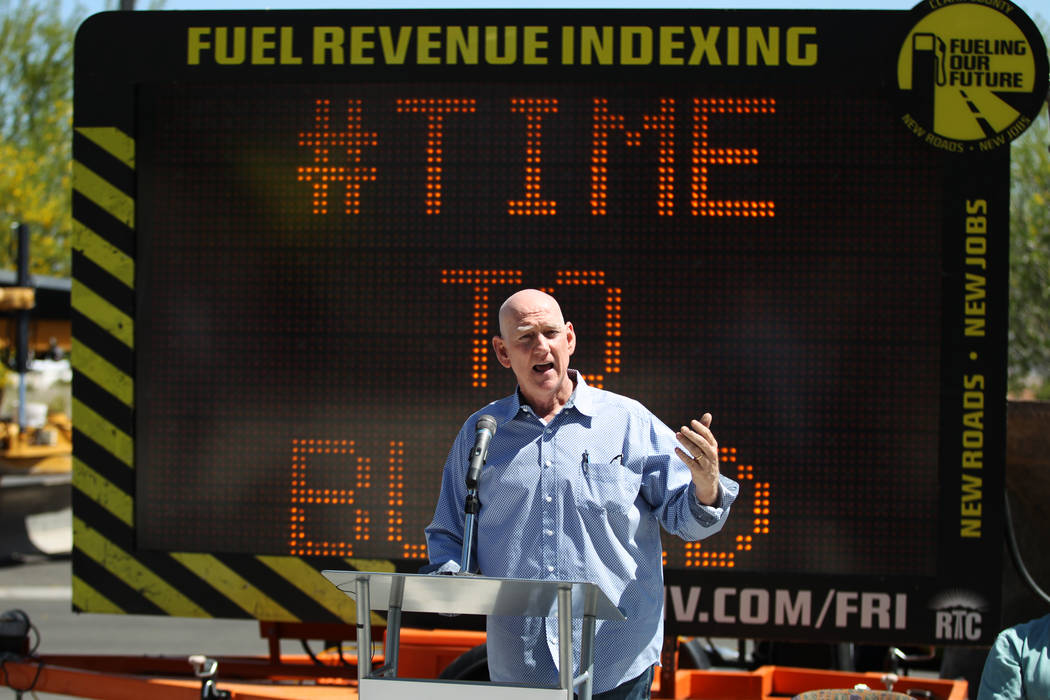STEVE SEBELIUS: Passing the buck on taxes
There was plenty of reluctance on display last week at the Clark County Government Center, where county commissioners faced the unpleasant task of raising taxes.
Thanks a lot, Nevada Legislature!
Lawmakers this session passed Assembly Bill 309, which allowed county governments in Nevada to increase the local sales tax by up to one-quarter of 1 percent to pay for things such as early childhood education, adult education, recruiting and retaining teachers, reducing truancy, reducing homelessness, increasing affordable housing and workforce training.
The county’s resolution required a two-thirds vote, because Nevada’s constitution demands taxes only be increased by a supermajority or a vote of the people.
“Nobody wants to be in the position that the Legislature put us in today, having to raise taxes,” said Commissioner Justin Jones, undoubtedly speaking for all of his colleagues.
Said Commissioner Larry Brown: “They dictate exactly what we can or cannot do.” His word choice was not haphazard.
Added Commissioner Jim Gibson: “It would be nice if the Legislature had just done this.”
But Commissioner Tick Segerblom — along with Jones and Chairwoman Marilyn Kirkpatrick, veterans of the Legislature all — explained that because of the two-thirds requirement, the Legislature didn’t have the votes to increase sales taxes. So they left the job to the locals instead. Because in Nevada, as the saying goes, tax policy rolls downhill.
In the end, the commission took pains to be conservative about their unwanted duty. Instead of a quarter-cent, they approved only one-eighth of a cent. Instead of giving the money directly to the school district, they created a process whereby organizations must apply for the money, explaining how it will be spent and setting measurable goals. And they put an expiration date on it: June 30, 2021, unless it’s extended.
And we all know how the sun never sets on taxes in Nevada.
But that’s someone else’s problem for another day, which is also the unofficial motto of tax policy in Nevada.
By all rights, the Legislature should have fixed this problem. It should have addressed the issue of property tax caps imposed in the boom years retarding the growth of those taxes post-recession — property taxes being the traditional and more stable source of revenue for public services such as schools, fire protection and police.
Instead, we’ve turned to the sales tax to hire new police officers and to provide education-related services, gimmicks that will rise and fall with the economy.
It’s always been thus: Back in 2008, voters approved an initiative petition to raise the room tax in Clark and Washoe counties to provide money for teachers’ salaries. Due to the recession, it was agreed the money would support the general fund for two years, and thereafter be put in a special account devoted only to educators.
But in 2011, the Legislature directed that money instead to the Distributive Schools Account, the state’s main education fund. The tax was still going to education, but certainly not in the way the voters originally intended. And the addition of that room-tax money (it amounted to about $180 million last year) to the schools account freed the state from having to put as much in from its general fund.
It’s called “supplanting,” a time-honored practice when gimmickry becomes necessary to balance the budget, which it almost always does in this state.
It was also in 2011, for example, that the state’s practice of “sweeping” funds from various accounts to balance budgets was challenged in court by the now-defunct Clean Water Coalition, an organization that seemed to exist primarily as a job program for an ex-county commissioner. But even if it never did anything else, the coalition did establish that Nevada could no longer steal local taxes to balance state budgets.
The state Supreme Court’s ruling that year — coming just as the Legislature was about to adjourn — put a hole in the state budget that the Legislature and the governor filled by retaining a package of taxes that would otherwise have expired. Those “sunset” taxes are now, of course, a permanent part of Nevada’s state budget.
The problem doesn’t just lie with the Legislature, where constitutional rules make raising taxes harder. It doesn’t just lie with local governments, which understandably resent when state lawmakers pass the buck on taxation.
The problem also lies with us, the people. We enjoy Nevada’s low-tax climate. (An income tax is prohibited under the state constitution, and property taxes are capped by law.) But we also want good schools staffed with good teachers, enough cops to fight crime in our neighborhoods and social services to deal with society’s ills. We cling stubbornly to the idea that we can have both, when we clearly can’t. Something has to give.
A friend of mine likes to say, “Everybody wants to go to heaven, but nobody wants to die.” Until we come to grips with the truth of that idea, expect gimmicks to supplant good tax policy in Nevada.
Contact Steve Sebelius at SSebelius@reviewjournal.com or 702-383-0253. Follow @SteveSebelius on Twitter.

















